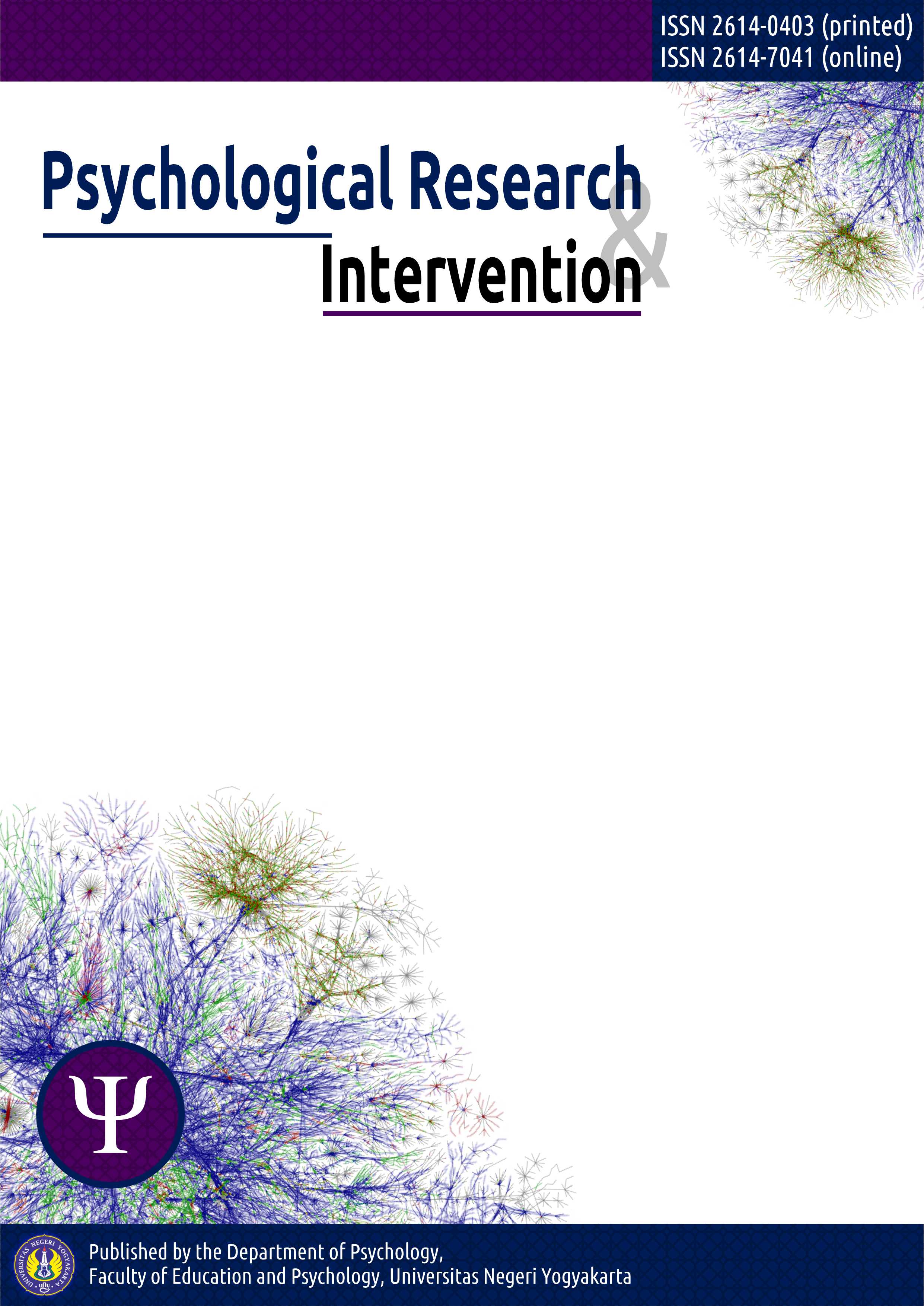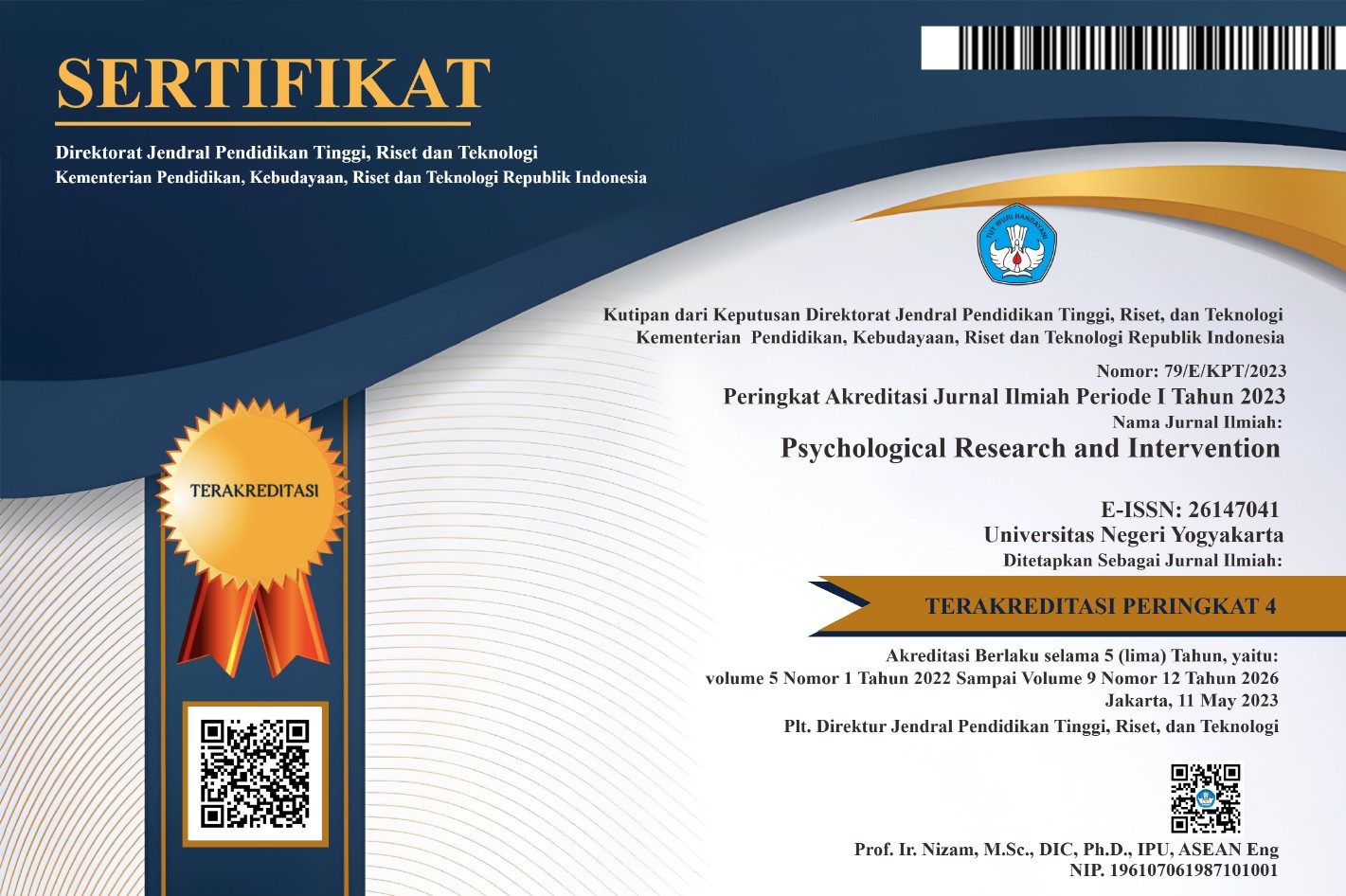Parental Involvement and Academic Achievement: A Meta-analysis
DOI:
https://doi.org/10.21831/pri.v4i2.45507Keywords:
meta-analysis, parental involvement, academic achievementAbstract
This study examined the relationship between parental involvement and academic achievement through the meta-analysis technique. A total of 40 studies from 18 journal articles that fulfilled the inclusion criteria were analyzed to find the correlation between variables. The result showed the correlation between parental involvement with academic achievement with r=0.251. The result could be concluded that there was a significant correlation between parent involvement and academic achievement. The estimated correlation value of this study is consistent with the previous meta-analysis studies on a similar topic.References
Alasuutari, M. (2010). Striving at partnership: parent–practitioner relationships in Finnish early educators' talk. European Early Childhood Education Research Journal, 18(2). https://doi.org/10.1080/13502931003784545
Benner, A. D., Boyle, A. E., & Sadler, S. (2016). Parental Involvement and Adolescents' Educational Success: The Roles of Prior Achievement and Socioeconomic Status. Journal of Youth and Adolescence, 45(6), 1053–1064. https://doi.org/10.1007/s10964-016-0431-4
Daniel, G. R., Wang, C., & Berthelsen, D. (2016). Early school-based parent involvement, children's self-regulated learning and academic achievement: An Australian longitudinal study. Early Childhood Research Quarterly, 36, 168–177. https://doi.org/10.1016/j.ecresq.2015.12.016
Dotterer, A. M., & Wehrspann, E. (2016). Parent involvement and academic outcomes among urban adolescents: examining the role of school engagement. Educational Psychology, 36(4), 812–830. https://doi.org/10.1080/01443410.2015.1099617
Ellis, P.D. (2010). The essential guide to effect sizes: Statistical power, meta-analysis, and the interpretation of research results. Cambridge: Cambridge University Press.
Fernández-Alonso, R., ílvarez-Díaz, M., Woitschach, P., Suárez-ílvarez, J., & Cuesta, M. (2017). Implicación familiar y rendimiento académico: Menos control y más comunicación. Psicothema, 29(4), 453–461. https://doi.org/10.7334/psicothema2017.181
Guo, X., Lv, B., Zhou, H., Liu, C., Liu, J., Jiang, K., & Luo, L. (2018). Gender Differences in How Family Income and Parental Education Relate to Reading Achievement in China : The Mediating Role of Parental Expectation and Parental Involvement. 9(May), 1–12. https://doi.org/10.3389/fpsyg.2018.00783
Hakyemez-Paul, S., Pihlaja, P., & Silvennoinen, H. (2018). Factors affecting early childhood educators' views and practices of parental involvement. Varhaiskasvatuksen Tiedelehti Journal of Early Childhood Education Research, 7(1), 76–99. Retrieved from http://jecer.org
Harris, A. L. & Robinson, K. (2016). A New Framework for Understanding Parental Involvement: Setting the Stage for Academic Success. Retrieved from https://muse.jhu.edu/article/633742
Hujala, E., Turja, L., Gaspar, M. F., Veisson, M., & Waniganayake, M. (2009). Perspectives of early childhood teachers on parent-teacher partnerships in five European countries. European Early Childhood Education Research Journal, 17(1), 57–76. https://doi.org/10.1080/13502930802689046
Hunter, J.E. & Schmidt, F.L. (2015). Methods of meta-analysis: Correcting error and bias in research findings. Third edition. Thousand Oaks, CA: Sage Publications, Inc.
Lara, L., & Saracostti, M. (2019). Effect of parental involvement on children's academic achievement in Chile. Frontiers in Psychology, 10(JUN), 1–5. https://doi.org/10.3389/fpsyg.2019.01464
Lv, B., Lv, L., Yan, Z., & Luo, L. (2019). The relationship between parental involvement in education and children's academic/emotion profiles: A person-centered approach. Children and Youth Services Review, 100(March), 175–182. https://doi.org/10.1016/j.childyouth.2019.03.003
McDowall, P. S., Taumoepeau, M., & Schaughency, E. (2017). Parent involvement in beginning primary school: Correlates and changes in involvement across the first two years of school in a New Zealand sample. Journal of School Psychology, 62, 11–31. https://doi.org/10.1016/j.jsp.2017.03.001
McNeal Jr, R. B. (2014). Parent Involvement, Academic Achievement and the Role of Student Attitudes and Behaviors as Mediators. Universal Journal of Educational Research, 2(8), 564–576. https://doi.org/10.13189/ujer.2014.020805
McNeal Jr, R. B. (2015). Parent involvement and student performance : the influence of school context. Educational Research for Policy and Practice, 153–167. https://doi.org/10.1007/s10671-014-9167-7
O'Donnell, J. & Kirkner, S. L. (2014). The Impact of a Collaborative Family Involvement Program on Latino Families and Children's Educational Performance. School Community Journal, 24(1), 211–234. Retrieved from https://lopes.idm.oclc.org/login?url=http://search.ebscohost.com/login.aspx?direct=true&db=eric&AN=EJ1032271&site=eds-live&scope=site
Papalia, D. E., Olds, S. W. & Feldman, R. D. (2008). Human Development: Psikologi Perkembangan. Edisi Kesembilan. Alih bahasa: Anwar, A. K. Jakarta: Kencana Prenada Media Group.
Park, S., & Holloway, S. D. (2017). The effects of school-based parental involvement on academic achievement at the child and elementary school level : A longitudinal study. The Journal of Educational Research, 110(1), 1–16. https://doi.org/10.1080/00220671.2015.1016600
Pirchio, S., Passiatore, Y., Tritrini, C., & Taeschner, T. (2013). The Role of the Relationship between Parents and Educators for Child Behaviour and Wellbeing. International Journal about Parents in Education, 7(2), 145–155.
Rogers, M. A., Theule, J., Ryan, B. A., Adams, G. R., & Keating, L. (2009). Parental involvement and children's school achievement: Evidence for mediating processes. Canadian Journal of School Psychology, 24(1), 34–57. https://doi.org/10.1177/0829573508328445
Silinskas, G., & Kikas, E. (2019). Parental involvement in math homework: Links to children's performance and motivation. Scandinavian Journal of Educational Research, 63(1), 17–37. https://doi.org/10.1080/00313831.2017.1324901
Tazouti, Y., & Jarlégan, A. (2016). The mediating effects of parental self-efficacy and parental involvement on the link between family socioeconomic status and children's academic achievement. Journal of Family Studies, 0(0), 1–17. https://doi.org/10.1080/13229400.2016.1241185
Veas, A., Gilar, R., & Miñano, P. (2016). The Influence of Gender, Intellectual Ability, Academic Self-Concept, Self-Regulation, Learning Strategies, Popularity and Parent Involvement in Early Adolescence. International Journal of Information and Education Technology, 6(8), 591–597. https://doi.org/10.7763/ijiet.2016.v6.757
Veas, A., Castejón, J. L., Miñano, P., & Gilar-Corbí, R. (2019). Relationship between parent involvement and academic achievement through meta cognitive strategies: A multiple multilevel mediation analysis. British Journal of Educational Psychology, 89(2), 393–411. https://doi.org/10.1111/bjep.12245
Wang, M. Te, & Sheikh-Khalil, S. (2014). Does Parental Involvement Matter for Student Achievement and Mental Health in High School? Child Development, 85(2), 610–625. https://doi.org/10.1111/cdev.12153
Wong, R. S. M., Ho, F. K. W., Wong, W. H. S., Tung, K. T. S., Chow, C. B., Rao, N., ... Ip, P. (2018). Parental Involvement in Primary School Education: its Relationship with Children's Academic Performance and Psychosocial Competence through Engaging Children with School. Journal of Child and Family Studies, 27(5), 1544–1555. https://doi.org/10.1007/s10826-017-1011-2
You, S., Lim, S. A., No, U., & Dang, M. (2016). Multidimensional aspects of parental involvement in Korean adolescents' schooling: a mediating role of general and domain-specific self-efficacy. Educational Psychology, 36(5), 916–934. https://doi.org/10.1080/01443410.2015.1025705
Yulianti, K., & Denessen, E. (2018). The effects of parental involvement on children's education: a study in elementary schools in Indonesia. International Journal about Parents in Education, 10(1), 14-32.












